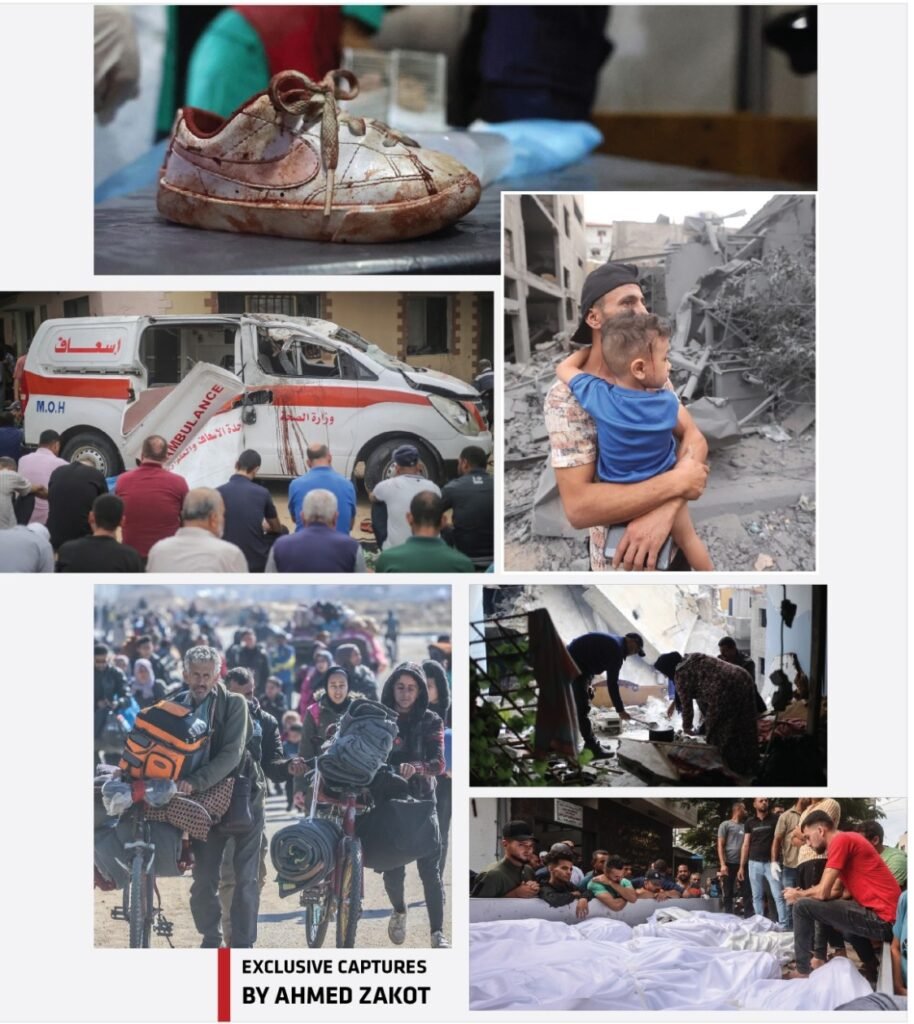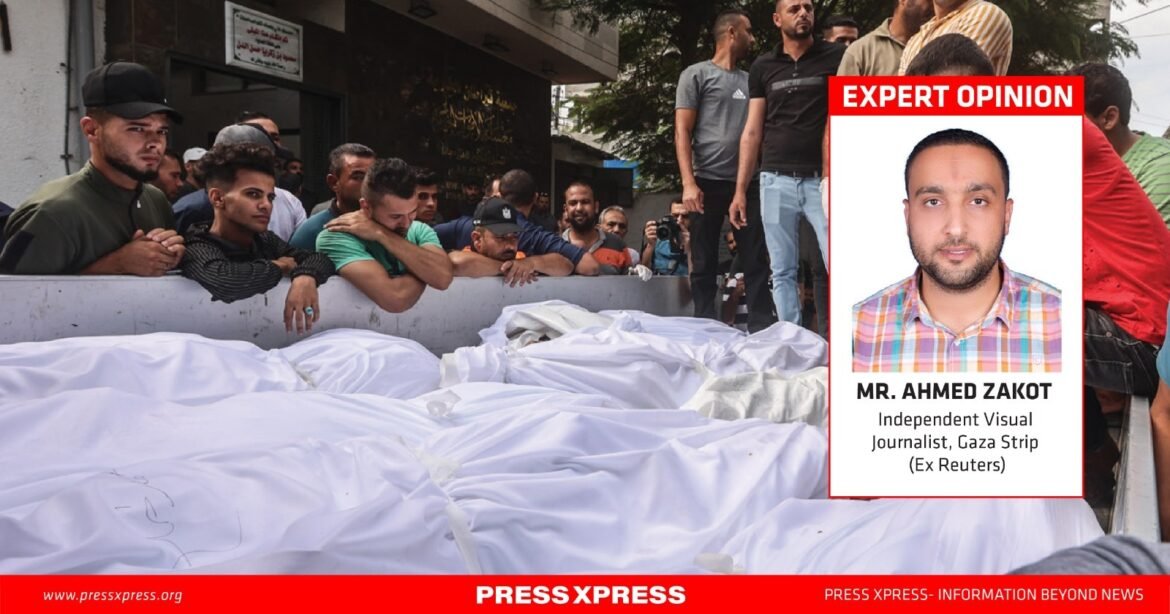As we mark one year since Israel’s brutal invasion of Gaza, the humanitarian crisis has only deepened, leaving countless lives shattered by relentless violence and displacement. Amidst this turmoil, Press Xpress had the opportunity to speak with Ahmed Zakot, an independent visual journalist with over 25 years of experience, including his time at Reuters. Zakot has been at the forefront, capturing the harsh realities on the ground and documenting the devastating effects of war on Palestinian civilians. His insights provide a powerful narrative of resilience and loss, drawing attention to the ongoing struggles of the people of Gaza.
In this exclusive interview, Zakot shares his personal experiences and reflections on life under the blockade, the plight of refugees, and the challenges of covering a conflict often mired in media bias. His stories offer a stark reminder of the human cost of war and the enduring spirit of those who continue to persevere amid unimaginable adversity.
What are the humanitarian impacts of the blockade on Gaza? What has life been like for Palestinian refugees?
Zakot: Human life was very difficult, as no human being, not even an animal, could accept those conditions caused by the Israeli war on the Gaza Strip and the Palestinian population. The crazy war forced people to leave their homes and move to tents because the Israeli army was ferocious in bombing homes. Thousands of homes were bombed, killing their residents, children, women, and the elderly.
Can you describe the living conditions in refugee camps in countries like Lebanon, Jordan, and Syria?
Zakot: Of course, the word refugee means that there is a human being who deserves to live in dignity in his home on the land of his homeland, and because he was forced to leave these two places: the homeland and the safe home, and since this human being left these two places, the human being has become a refugee, and this has been the life of the Palestinians for more than 70 years. Israel is the one that abandoned Palestinians from their state, villages, and towns through war and killing over the past 70 years, which is the reason for the existence of those camps spread in Jordan, Lebanon, and Syria. And here is the matter being renewed that Israel has made the Palestinians become new refugees in their homeland, as in this war that has been ongoing since last October, Israel has been forced More than 2 million Palestinian residents of the Gaza Strip have once again sought refuge inside the Gaza Strip, where they are now living in tents in remote and desert areas. Their living conditions are miserable and miserable.
Chronic and infectious diseases have spread among them and they have died of hunger. Famine has spread in the northern Gaza Strip again a week ago after it stopped. Bringing in aid because the Israeli army prevented it after it took military control of the Gaza Strip and separated the Gaza Strip into two halves. People suffer from the heat of the sun and the lack of potable water in the displacement camps where they have taken Refuge in the southern Gaza Strip.
This matter negatively affected the social order among the Palestinian population, as crime and murder spread, and the absence of law affected their internal order within their land.

Can you detail some of the most brutal attacks on Palestinian civilians that you have experienced while capturing the moments? Can you please share any personal stories from individuals you have photographed that highlight the human cost of these attacks?
Zakot: I have been working as a journalist for almost 25 years. I photograph moments, stories, events, daily life, and ways of life. I have covered four wars in the Gaza Strip, but I can say with all frankness that this is the first war I’ve covered where I feel fear and anxiety due to its ferocity and brutality toward Palestinian civilians. This war is also different because it disregards the ethical laws that should protect journalists and humanitarian relief crews in Gaza.
The Israeli army has targeted everything with no red lines, killing journalists, activists, international relief workers, foreigners, children, women, and the elderly. There was no kind of international protection for any of those I mentioned, all under the pretext of eliminating so-called terrorism by Israel.
While covering and filming, I felt deeply for the people and families being killed and bombed. I felt that one day I could be in their place, or that I might lose a family member because of this war. One day, while photographing those displaced from the northern Gaza Strip to the south, I passed by an emaciated, exhausted man dragging his elderly mother on foot, their swollen feet bare. I remembered a story my grandfather told me before he died, fifteen years ago, about their exodus from our original city, “Ashdod.”
The image I saw was the same one he described. I cried and stopped photographing because my grandfather had told me that what happened in 1948 would never happen again, yet here we are in 2023, witnessing the same suffering.
As you have been documenting Gaza for the last 25 years, can you discuss the challenges of media bias and misinformation in covering the conflict?
Zakot: There is extensive media coverage of events in the Gaza Strip, and many Western media outlets are providing objective reports. However, a number of Western media outlets, including American ones, remain biased towards Israel, despite the scenes of massacres, bombings, and devastation caused by the Israeli army.
They continue to practice selective blindness and deception in their coverage. Meanwhile, Palestinian journalists face significant challenges during their coverage of the war, as they have over the past 30 years, contending with the Israeli disinformation machine.
What do you see as the future for Palestinians in terms of achieving peace and justice for their own land?
Zakot: Regarding the future of the Palestinians, I believe there will be no stability for them in the next ten years due to Israeli practices and the silence of the international community, which has failed to deter Israel and halt its actions of war, killing, starvation, captivity, and intimidation against the Palestinians. The prospects for peace are grim, particularly as Israel continues to reject the two-state solution proposed by the international community as a path to regional peace.
Unfortunately, there seems to be no bright or secure future ahead, not only for the Palestinians but also for the Israelis, as their government and military continue to undermine peace efforts with this destructive war on the Gaza Strip.
According to you, how can the international community better support the Palestinian cause?
Zakot: The international community, along with the United Nations, must play a fundamental role in addressing any controversial issue that arises globally. Greater pressure must be applied to Israel to end the conflict as quickly as possible, sparing the region from the potential outbreak of a third world war. The ongoing Israeli conflict is at the heart of this crisis, with the Palestinians poised as the fuse for a broader conflict if the situation is not halted immediately.
The solution lies in pressuring Israel by threatening to prosecute its political and military leaders in international courts, cutting off funding for all types of weaponry, and urging Israel’s allies to increase pressure for an end to the war.


